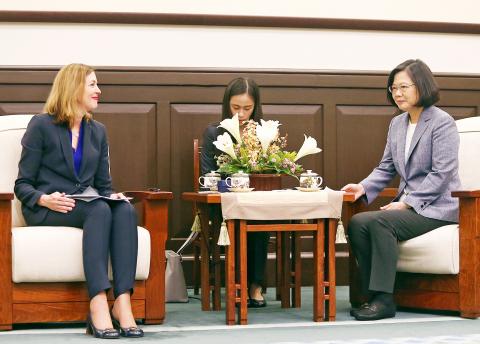Taiwan is to work more closely with the US on defense and other exchanges as China unilaterally destabilizes regional peace, President Tsai Ing-wen (蔡英文) said yesterday in a meeting with US officials.
Tsai met with American Institute in Taiwan (AIT) Chairman James Moriarty at the Presidential Office Building, where they discussed shared ideas about democracy and talked about the enduring Taiwan-US relationship.
Tsai thanked the US and other nations of “similar [political] philosophies” for their support as Taiwan faces the challenges presented by Chinese aggression.

Photo: CNA
Taiwanese were deeply touched by Washington and others speaking up on Taiwan’s behalf when China pressured international airlines to change Taiwan’s designation on their Web sites, she said.
The nation would continue to work closely with the US for the benefit of the people of both nations, and would face challenges to regional peace and stability together, Tsai said, adding that the US has a special understanding of the situation facing Taiwan.
Tsai, who attended Tuesday’s dedication of the new AIT compound in Taipei’s Neihu District (內湖), said the structure is symbolic of the enduring relationship between the two nations, which “becomes ever more resolute with the passing of time.”
The compound — which cost US$255.6 million — was an investment in the two nations’ relationship by the US, she said.
Tsai quoted Moriarty as saying in a speech at Stanford University last month that Taiwan serves as a successful example of democracy not only for the region, but the entire world, adding that the relationship between the two nations has its foundation in shared democratic values.
Tsai also thanked the US for approving US military contractors to sell components to Taiwan for its domestic submarine program, and said that Taiwan would work closely with the US on regional defense in the face of heightened tensions caused by increased Chinese military activity.
Moriarty said that from the passage of the Taiwan Travel Act in March, people could see that the US was fully committed to fulfilling its promises to Taiwan.
The US would unceasingly strive to guarantee Taiwan’s ability to have a voice in international contexts, he said.
Tsai also spoke with US Assistant Secretary of State for Educational and Cultural Affairs Marie Royce at the Presidential Office Building.
Tsai said she was happy to see Royce again, who she described as an old friend, adding that Royce’s visit represented the US’ support for Taiwan.
From 2016 to last year, 21,516 Taiwanese students attended schools in the US and 3,200 Taiwanese students were involved in exchange programs in the US, Royce said.
Each of those students has had their life changed through studying in the US, Royce said, adding that she believed Tsai could deeply relate to that experience.
Tsai received her master’s degree from Cornell University Law School in 1980.
Royce said she was looking at how the two nations could strengthen cultural and educational exchanges.
While Royce is responsible for managing educational and cultural affairs, she is also a successful entrepreneur and educator, Tsai said.
“As someone with many years of experience in the area of international cultural and educational exchanges, we very much look forward to working closely with her,” Tsai said.

A Ministry of Foreign Affairs official yesterday said that a delegation that visited China for an APEC meeting did not receive any kind of treatment that downgraded Taiwan’s sovereignty. Department of International Organizations Director-General Jonathan Sun (孫儉元) said that he and a group of ministry officials visited Shenzhen, China, to attend the APEC Informal Senior Officials’ Meeting last month. The trip went “smoothly and safely” for all Taiwanese delegates, as the Chinese side arranged the trip in accordance with long-standing practices, Sun said at the ministry’s weekly briefing. The Taiwanese group did not encounter any political suppression, he said. Sun made the remarks when

The Taiwanese passport ranked 33rd in a global listing of passports by convenience this month, rising three places from last month’s ranking, but matching its position in January last year. The Henley Passport Index, an international ranking of passports by the number of designations its holder can travel to without a visa, showed that the Taiwan passport enables holders to travel to 139 countries and territories without a visa. Singapore’s passport was ranked the most powerful with visa-free access to 192 destinations out of 227, according to the index published on Tuesday by UK-based migration investment consultancy firm Henley and Partners. Japan’s and

BROAD AGREEMENT: The two are nearing a trade deal to reduce Taiwan’s tariff to 15% and a commitment for TSMC to build five more fabs, a ‘New York Times’ report said Taiwan and the US have reached a broad consensus on a trade deal, the Executive Yuan’s Office of Trade Negotiations said yesterday, after a report said that Washington is set to reduce Taiwan’s tariff rate to 15 percent. The New York Times on Monday reported that the two nations are nearing a trade deal to reduce Taiwan’s tariff rate to 15 percent and commit Taiwan Semiconductor Manufacturing Co (TSMC, 台積電) to building at least five more facilities in the US. “The agreement, which has been under negotiation for months, is being legally scrubbed and could be announced this month,” the paper said,

Japan and the Philippines yesterday signed a defense pact that would allow the tax-free provision of ammunition, fuel, food and other necessities when their forces stage joint training to boost deterrence against China’s growing aggression in the region and to bolster their preparation for natural disasters. Japan has faced increasing political, trade and security tensions with China, which was angered by Japanese Prime Minister Sanae Takaichi’s remark that a Chinese attack on Taiwan would be a survival-threatening situation for Japan, triggering a military response. Japan and the Philippines have also had separate territorial conflicts with Beijing in the East and South China